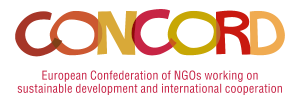Promotion of civic space and enabling environment in EU external action is a key topic CONCORD works on. This new paper examines civil society at the heart of democracy and sustainable development and looks at the key components of civic space which are necessary to enable an environment where civil society can peruse and express basic rights. Civil society organisations can play an important facilitating role to make the voices of people audible. This paper targets civil society as well as EU institutions and Member States by building some relevant recommendations.

Civil society is at the heart of democracy and sustainable development
Civil society is essentially people coming together and organising themselves in the pursuit of common interests, which is a basic right of any human being. There are many different expressions of civil society, with multiple types of actors, roles and mandates. Forming organisations is both a right and a means of making people’s participation and commitment to change effective and sustainable. Civil society organisations can play facilitating roles by amplifying the voices of people facing marginalization and exclusion, by defending and asserting rights, and by demanding transparency and accountability.
Key components of civic space and an enabling environment for civil society
The restrictions of civic space in many countries are linked to an anti-democratic development globally that questions the universality of human rights. At the root of this are attempts by rulers to concentrate power and evade accountability to people. The democratic space is put at risk also in European countries (as demonstrated in CIVICUS Report) due to similar non-democratic, populist and nationalist trends. The closing of civic space has severe negative impacts on an inclusive and sustainable development.
For an enabling environment for civil society, the rights to freedom of association and assembly, and other related fundamental freedoms and rights must be respected in:
+ Values, norms and attitudes in society
+ Legal framework
+ Regulatory environment
+ Access to funding
+ Meaningful participation in decision making
Summarised CONCORD Recommendations to EU institutions and Member States

1. To develop an overarching EU strategy for civic space
- Develop an overarching EU strategy on civic space that includes guidelines on the rights to freedom of association and assembly
- In external action, combine political dialogue, development cooperation and heightened diplomatic pressure to protect and expand civic space
- Develop and implement early warning – early response mechanism for in-country developments indicating closing civic space

2. To promote an enabling environment and civic space in the EU´s partner countries
- Promote civic space systematically in the EU’s political dialogue with partner governments
- Strengthen a structured dialogue with a diverse range of CSOs and mechanisms for inclusion and genuine participation of civil society, supported by the EU Country Roadmaps process

3. To strengthen partnerships, capacity building and alliances
- Reinforce EU support and engagement with civil society, and specifically organisations facing repression
- Support partnerships, networking, capacity building and peer-learning, applying the Istanbul Principles and similar codes in a spirit of shared responsibility, mutual trust and accountability

4. To provide adaptive, institutional and predictable funding
- Use core funding and other process-oriented funding, respecting CSOs as actors in their own right
- Adapt the funding modalities to the context and the diversity of civil society, including small CSOs and CSOs representing specific
groups that are often overlooked by funders (women, LGBTI, minorities, etc) - Navigate access to funding for civil society organisation subjected to temporary or permanent restrictions or funding gaps

5. To practice what we preach
- Ensure coherence in external and internal EU action to defend fundamental rights and freedoms
- Practice the principles of effective development cooperation
